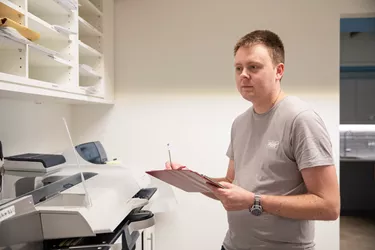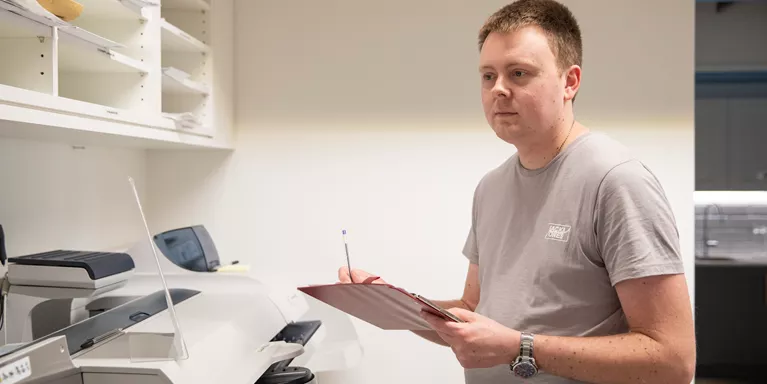How my workplace helped me open up about my anxiety
Erin couldn't hide her anxiety at work any longer but she felt safe opening up to her employer and colleagues.
I never wanted to talk about my anxiety disorder at work I was diagnosed with generalised anxiety disorder in 2013, though my anxiety is mostly related to my health. I worry excessively about everything from my moles to my muscle aches. I exhaust myself checking my body for abnormalities and I have an unhealthy addiction to online self-diagnosis.
"Until earlier this year, my anxiety existed separately from my professional life and I was skilled at hiding my symptoms."
This secrecy became more important to me as I progressed into more senior roles. I could function expertly at work and then collapse into bed the moment I arrived home. At home, I indulged in Googling my imagined symptoms until I was sweaty and shaking in anticipation of my imminent death.
"I was proud of my ability to keep my anxiety hidden from my colleagues and saw it as a sign of strength. Until the day it became impossible."
I'm Head of Alumni Relations at Imperial College Business School in London. My job is extremely social and I spent a lot of time meeting with colleagues, alumni and other professionals. I attend events, travel and manage a small team that supports the Business School’s graduates.
It's engaging, exciting and no two days are ever the same. I am conscious about how I am perceived professionally and I have worked hard to progress my career.
I learned earlier this year that anxiety doesn’t care.
I went to work one day last March feeling more on edge than usual. It had been a busy few months and I wasn’t sleeping or eating well. I also had a cold that wouldn’t go away and I, of course, believed it was undiagnosed lung cancer.
I remember thinking that morning that I needed to pull myself together. I remember feeling worried that my colleagues would see through my excuses of just being tired.
"My whole body felt strung out with the effort of pretending I was ok."
I was with a colleague when I felt my chest tighten and my breath become shallow. My body broke out in a cold sweat and I started crying uncontrollably. The small part of reason I was clinging to knew it was a panic attack; anxiety was certain it was a heart attack. I had no choice but to ask for help and expose my illness.
Imperial College has over 100 trained Mental Health First Aiders to provide information and signpost staff to mental health resources. Staff wear bright green lanyards around their necks to make them easily identifiable. I knew that one of my team members was part of the programme and I called her.
She provided immediate reassurance and helped me to control my breathing. She didn’t judge me and quickly organised a taxi to take me to A&E for tests.
I think anyone who suffers from a mental illness can relate to feelings of shame and vulnerability. I was embarrassed to check myself into A&E for what deep down I knew was a panic attack. I was worried that I would be wasting valuable medical resources, but really I wasn’t well and I needed to be seen by a medical professional.
I hated letting my team down and worried about whether they would think I was weak.
"I felt exposed and angry with myself for not being able to manage my illness."
I left the hospital later that same day feeling empty and shaken. It was important for me to return to work quickly and I needed to decide how much I was going to share.
My team had texted me throughout day with offers of support and deliveries of food. I don’t think they realised what an impact their words would have on my decision to go public with my illness at work.
"Their support gave me the initial confidence."
I was also confident in Imperial’s commitment to supporting mental health and knew there would be no professional consequences to being candid about my illness.
I can’t stress how important it is for me to work at an organisation with this ethos. While not all my colleagues are comfortable hearing details or even talking about mental illness abstractly, the College is committed to the wellbeing of its staff, students and faculty and I feel safe in this knowledge.
However, at the heart of my decision was my personal wellbeing. My experience showed me the serious consequences of trying to separate my anxiety from my personal life. I needed to acknowledge it and be aware of its potential to impact all areas of my life.
I was truthful with my team about my panic attack and told them I suffered from anxiety. I explained that most days I managed my illness, but sometimes a series of factors made it overwhelm me.To move forward and continue being successful, I had to be honest.
"Hiding my illness at work had nearly made me unable to do a job I love."
Mental illness is a difficult and often personal topic. I constantly worry that my panic attack, and my subsequent willingness to be so open, has compromised how colleagues view me professionally. I wonder if they question my ability to perform or think I won’t be able to handle certain situations.
Sometimes I find myself working harder to prove that I won’t be defined by having a mental illness. My colleagues have done nothing but be supportive, even if they don’t know always know what to say.
I struggle daily to reconcile my professional, competent self with the version of me that sometimes can’t get dressed on a Sunday for obsessing about a mysterious bruise. I know my behaviour can be erratic at times and that my anxiety makes it difficult to focus.
"I am trying to find a better balance and be comfortable with not always being ok."
We live in a country where topics of conversation tend to revolve around the weather and train strikes. My experience has given me a voice and a different perspective on what it means to be strong. It’s given me an opportunity to share with other people and encourage them not to be afraid to talk about their mental illness.
We don’t have a choice anymore.


Information and support
When you’re living with a mental health problem, or supporting someone who is, having access to the right information - about a condition, treatment options, or practical issues - is vital. Visit our information pages to find out more.
Share your story with others
Blogs and stories can show that people with mental health problems are cared about, understood and listened to. We can use it to challenge the status quo and change attitudes.

















